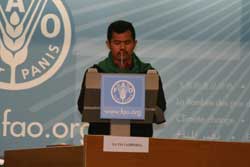Ladies and gentlemen,
This high level that is taking place now actually should be to celebrate the success of leaders of state and government in eradicating hunger and poverty in the world. Because the head of states has given their commitment during the world food summit in 1996 to eradicate hunger by halving the hunger by 2015.
Unfortunately, the world is seeing thousands of peasants who commit suicide because they are always bankrupt and cannot pay back their loans. The world sees people suffering from hunger everywhere and children who are malnourished. The world sees ordinary people who have to queue in line under the sun with a coupons in their hand, waiting for food aid. In some places these queues have turned into food riots.llions of people
These are the results of the policies that you are responsible for. These are the results that the liberalisation of food and agricultural markets have provoked. Policies which force farmers to produce food for export and push the government to import basic foodstuffs. The industrial model of agriculture has also created a situation that has brought agriculture under the control of transnational agribusiness corporations, many who have profited from the current crisis.
This fails the people’s right to food. This fails the people’s right to a livelihood.
In 2002, I was standing in this same spot in this building in front of you, during the FAO conference for the World Food summit. In 2002, I tore the paper I held in my hands and I ate it. I ate it because at the time, we did not believe that the policy of FAO would alleviate hunger. I ate it because we knew that the people of the world would be left with only paper and no concrete policies which would feed them.
I represent millions of peasants and small farmers, members of Via Campesina around the world in more than fifty countries.
ing here again, in this same building, with all the delegates representing all the countries of the world to demand the same things I demanded in 2002. The policies you prescribed in 2002 have failed. There are more people in the world suffering from hunger and poverty now than in 2002. We don’t want to see the same mistakes made again.
Our solution to solve the food crisis is to put the control of food into the hands of small farmers. As you are all aware, small farmers are those who produce the food, but they have also become net consumers of food. We cannot put the control of food into the hands of agribusiness corporations. We have to let farmers feed their own families and their own local communities. This is what food sovereignty means. This is what we demand.
Food is a necessity for life. It should not be a commodity to be speculated upon on international markets.
Via Campesina have been struggling for agrarian reform and land reform. The FAO should continue their commitment to this which was made in 2006 at the International Conference on Agrarian Reform and Rural Development(ICARRD). FAO has also supported integrated pest management, which does not make farmers dependent on chemicals produced by transnational companies.
Sustainable peasant agriculture is also the answer to climate change. It is an efficient model of agriculture, which does not need the fuel and energy demanded by industrial agriculture.
We should be ashamed and filled with guilt because we could not eradicate hunger. Instead of eradicating hunger we have increased the number of hungry in the world. Therefore today we should evaluate the policies have been implemented. You have to admit you were wrong. The proof is in the empty stomachs of millions of people.
Rome, 5 June 2008

